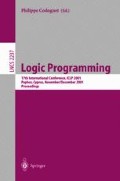Abstract
CHRs are a multi-headed committed choice constraint language, commonly applied for writing incremental constraint solvers. CHRs are usually implemented as a language extension that compiles to the underlying language. In this paper we discuss the optimizing compilation of Constraint Handling Rules (CHRs). In particualr, we show how we can use different kinds of information in the compilation of CHRs in order to obtain access efficiency, and a better translation of the CHR rules into the underlying language. The kinds of information used include the types, modes, determinism, functional dependencies and symmetries of the CHR constraints. We also show how to analyze CHR programs to determine information about functional dependencies, symmetries and other kinds of information supporting optimizations.
Access this chapter
Tax calculation will be finalised at checkout
Purchases are for personal use only
Preview
Unable to display preview. Download preview PDF.
References
S. Abdennadher. Operational semantics and confluence of constraint propagation rules. In Proceedings of the Third International Conference on Principles and Practice of Constraint Programming, pages 252–266, 1997.
B. Demoen, M. García de la Banda, W. Harvey, K. Marriott, and P.J. Stuckey. An overview of HAL. In Proceedings of the Fourth International Conference on Principles and Practices of Constraint Programming, pages 174–188, 1999.
T. Frühwirth. Theory and practice of constraint handling rules. Journal of Logic Programming, 37(1–3):95–138, 1998.
C. Holzbaur and T. Frühwirth. Constraint handling rules, special issue. Journal of Applied Artificial Intelligence, 14(4), 2000.
Z. Somogyi, F. Henderson, and T. Conway. The execution algorithm of Mercury: an efficient purely declarative logic programming language. Journal of Logic Programming, 29:17–64, 1996.
Author information
Authors and Affiliations
Editor information
Editors and Affiliations
Rights and permissions
Copyright information
© 2001 Springer-Verlag Berlin Heidelberg
About this paper
Cite this paper
Holzbaur, C., de la Banda, M.G., Jeffery, D., Stuckey, P.J. (2001). Optimizing Compilation of Constraint Handling Rules. In: Codognet, P. (eds) Logic Programming. ICLP 2001. Lecture Notes in Computer Science, vol 2237. Springer, Berlin, Heidelberg. https://doi.org/10.1007/3-540-45635-X_13
Download citation
DOI: https://doi.org/10.1007/3-540-45635-X_13
Published:
Publisher Name: Springer, Berlin, Heidelberg
Print ISBN: 978-3-540-42935-7
Online ISBN: 978-3-540-45635-3
eBook Packages: Springer Book Archive

